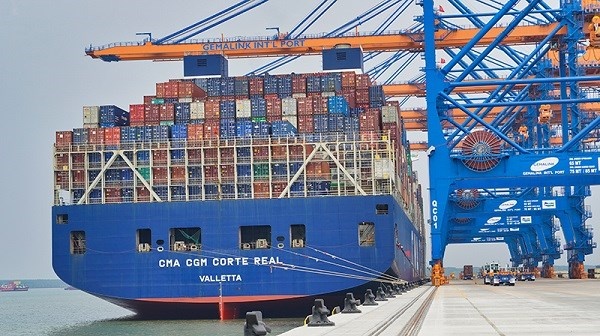Exporters building pay contingencies
 |
| Exporters building pay contingencies, (Photo: baochinhphu.vn) |
In the past couple of weeks, the Board of Directors of Vietnam National Textile and Garment Group (Vinatex) hurried to collect information about the export situation of the group and its member companies to deal with problems, including payment issues.
General director Cao Huu Hieu told VIR that the payment between Vinatex’s member companies and partners in Russia will not be impacted by the Russia-Ukraine conflict in the short term.
“Last week, partners in Russia transferred money to Duc Giang Garments, a member of Vinatex, as usual and without any difficulty. However, for the long-term, I think that we still need to prepare alternative solutions to avoid risks,” Hieu said.
The garment and textile sector’s export turnover to Russia just makes up a tiny part of the total export value overseas, amounting to $339 million in 2021, only about 1 per cent of the total. Duc Giang Garment’s share was $8 million.
“In the long-term, we forecast that instead of difficulties in payments, garment and textile exports to Europe may be impacted because of Turkey. Although Turkey is currently a majority exporter to Russia, they could redirect exports to Europe,” Hieu said.
Meanwhile, Dang Hoang Giang, general secretary of the Vietnam Cashew Association (Vinacas) said that payments may be interrupted. However, there are currently alternative payment methods, such as the IBAN system, which has a smaller coverage than the SWIFT system. Besides this, enterprises will be proactive in looking for new payment methods to adapt to the new situations. “Although the export turnover of cashews to Russia is not large, the members of Vinacas also look to government agencies for solutions from banks,” Giang said.
The concern of exporters comes from the EU’s move on March 2, when the bloc removed seven Russian banks from the SWIFT system including VTB Bank, Russia’s second-largest bank.
According to the State Bank of Vietnam (SBV), international payments in Vietnam are mostly carried out through SWIFT and Western Union money transfers under agreements with domestic credit institutions. Money transfers are also done via mail and telex. But SWIFT dominates because it is faster, more secure, and cost-efficient than other means.
Although Vietnam and Russia are both members of a free trade agreement that also involves Armenia, Belarus, Kazakhstan, and Kyrgyzstan, Russia is not a big trade partner of Vietnam. In 2021, the total export-import turnover between Vietnam and Russia reached $7.3 billion, including $4.5 billion earned by Vietnam’s exports, or only 1.33 per cent of the Southeast Asian nation’s total export value of $336.31 billion. Vietnam’s main exports to Russia have included mobile phones and parts (33 per cent), computers and electronics (13 per cent), garments and textiles (10.5 per cent), along with seafood, nuts, coffee, tea, and pepper.
Pham Nguyen Anh Huy, senior lecturer in finance and founder of RMIT FinTech-Crypto Hub, said that the EU’s sanctions on Russia will affect payments from Vietnam to Russian partners and vice versa, especially for transactions between import-export enterprises and banks covered by the ban.
With the exception of oil and gas corporations, enterprises in industries that account for a large proportion of exports such as electrical and electronic equipment, or imports such as grain, iron, and steel, will suffer negative effects from this sanction.
“Vietnam can look for several alternative payment solutions. It can explore Russia’s SPFS system through intermediary countries such as China, Cuba, Turkey, and others, or participate directly in it. Vietnam and Russia could establish a bilateral communication system for payments. Alternatively, Vietnam could consider using China’s CIPS payment system,” Huy said.
Businesses, the SBV, and Vietnam’s credit institutions should continue to closely monitor developments in the international payment market and the possible actions that the parties may take in the near future, according to Huy.
“On a positive note, Vietnamese businesses and banks can see this as an opportunity to learn more about other payment systems and prepare contingency plans for payment risks,” he said.
What the stars mean:
★ Poor ★ ★ Promising ★★★ Good ★★★★ Very good ★★★★★ Exceptional
Related Contents
Latest News
More News
- State corporations poised to drive 2026 growth (February 03, 2026 | 13:58)
- Why high-tech talent will define Vietnam’s growth (February 02, 2026 | 10:47)
- FMCG resilience amid varying storms (February 02, 2026 | 10:00)
- Customs reforms strengthen business confidence, support trade growth (February 01, 2026 | 08:20)
- Vietnam and US to launch sixth trade negotiation round (January 30, 2026 | 15:19)
- Digital publishing emerges as key growth driver in Vietnam (January 30, 2026 | 10:59)
- EVN signs key contract for Tri An hydropower expansion (January 30, 2026 | 10:57)
- Vietnam to lead trade growth in ASEAN (January 29, 2026 | 15:08)
- Carlsberg Vietnam delivers Lunar New Year support in central region (January 28, 2026 | 17:19)
- TikTok penalised $35,000 in Vietnam for consumer protection violations (January 28, 2026 | 17:15)

 Tag:
Tag:




















 Mobile Version
Mobile Version